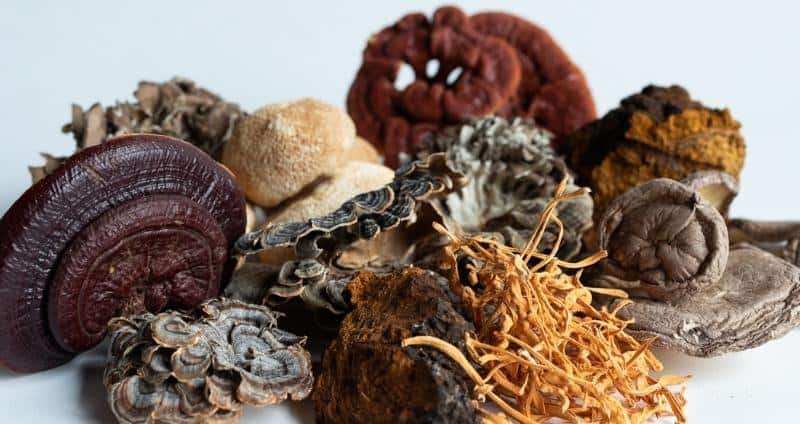Medicinal mushrooms have been used for centuries in traditional Chinese medicine. They offer numerous health benefits and are a natural remedy for the therapy and prevention of various medical conditions, from kidney deficiency to cancer treatment.
What are medicinal mushrooms?
Medicinal mushrooms are biologically different from all other plant-based foods, including fruits, vegetables, and grains. Their composition includes a unique set of inherently distinctive phytonutrients. It is precisely their impressive health properties that make medicinal mushrooms a cornerstone of traditional Chinese medicine.
Western European medical specialists have shown a growing interest in medicinal mushrooms. A large number of clinical studies demonstrate their high effectiveness in terms of prevention and even treatment of many diseases, including cancer, cardiovascular diseases, diabetes, and neurodegenerative disorders. Although they have been used for thousands of years, the mechanisms through which medicinal mushrooms affect human health are only now coming to light.
Nutrients in medicinal mushrooms
Medicinal mushrooms are a rich source of nutrients that offer a variety of health benefits. They provide essential B vitamins, selenium, copper, potassium, and are one of the few natural dietary sources of vitamin D2.
Despite their high content of vitamins and minerals, recent clinical studies focus on other bioactive compounds that are part of the chemical composition of medicinal mushrooms, such as polyphenols, carotenoids, lycopene, polysaccharides, and some rare types of amino acids.
These nutrients are unique to medicinal mushrooms and are not found in large quantities in other types of food. Here are some of them:
- Beta-glucans – these are polysaccharides that strengthen the immune system and can reduce cholesterol levels in the blood.
- Ergothioneine – an antioxidant that helps protect cells from damage caused by free radicals.
- Polysaccharides – they help regulate blood glucose levels and can improve liver function.
- Lectins – they strengthen the protective function of the immune system and protect against infections.
- Triterpenes – they can help reduce inflammatory processes in the body.
- Polypeptides – they have antibacterial and antiviral properties.
- Minerals – medicinal mushrooms contain high levels of minerals such as potassium, magnesium, and iron, which support normal bodily functions and increase their antioxidant capacity.
How the powerful complex of polysaccharides in medicinal mushrooms works?
Medicinal mushrooms contain potent polysaccharides that are considered responsible for many of their beneficial properties. These polysaccharides are long-chain carbohydrates linked by glycosidic bonds.
Experts study two main types of polysaccharides in medicinal mushrooms – beta-glucans and polysaccharide-protein complexes. These polysaccharides have great potential for immunomodulation and possess anti-cancer effects. In vivo and in vitro observations indicate that polysaccharides and polysaccharide-protein complexes act as modifiers of the biological response and function as cancer preventatives.
In the gastrointestinal tract, polysaccharides play the role of a prebiotic substrate, promoting the growth of beneficial gut bacteria. It has been proven that mushrooms have powerful antioxidant activity, much of which is attributed to polysaccharides, although the content of lycopene and polyphenols also has a protective function against the harmful effects of free radicals.
Medicinal mushrooms for immune health
Medicinal mushrooms promote immune health in various ways, including by supporting different immune cells such as:
- Macrophages
- Natural Killer (NK) Cells
- T-lymphocytes
- Cytokines
Polysaccharides in medicinal mushrooms indirectly modulate immune function by stimulating both the innate and adaptive immune systems. They do not have a direct cytotoxic effect on cancer cells; instead, they induce various cellular reactions that enhance immune function. Beta-glucans can also enhance immune protection by activating T-cells, natural killer cells, and macrophages, strengthening their anti-tumor activity. These combined actions can enable the body’s immune system to better combat the damaging effects of cancer cells.
Furthermore, mushrooms exhibit inhibitory effects against certain types of cancer, including breast, liver, cervical, pancreatic, and stomach cancers, as well as acute leukemia.
Unique Ergothioneine
Ergothioneine is a unique sulfur-containing amino acid synthesized from histidine by mycobacteria and non-spore-forming fungi in the soil. It is found in very few foods but is highly concentrated in medicinal mushrooms. Recently, it was discovered that all animals have a specific transport molecule for ergothioneine, indicating that this amino acid plays a significant physiological role. Studies have found that when there is a deficiency of ergothioneine in the body, cells become more susceptible to oxidative stress, damage to mitochondrial DNA, protein oxidation, and lipid peroxidation. It is believed that this chemical compound protects against oxidative damage and acts as a powerful antioxidant.
Since animals cannot synthesize ergothioneine and only obtain it through food, and a deficiency of this nutrient has significant consequences for health, some researchers propose categorizing it as a new type of vitamin.
Important medicinal mushrooms you should know
- Shiitake mushrooms (Lentinula edodes) are the most studied type of mushrooms and have a long history of medical use due to their numerous potential health benefits, ranging from cancer protection to cholesterol reduction. It has been established that these medicinal mushrooms have anti-cancer properties and can modulate the immune system by increasing the activity of T cells. Shiitake extracts are used as an adjunct therapy to chemotherapy and radiation therapy. They are considered a potent antimicrobial agent, and consuming shiitake mushrooms may increase resistance to bacterial, fungal, parasitic, and viral infections.
- Maitake mushrooms (Grifola frondosa) are particularly sought after for their unique taste and texture. It has been found that Maitake mushrooms protect against metastasis and can slow down or stop tumor growth in various parts of the body. They maintain the activity of lymphocytes and natural killer cells, which protect the body from infections and viral diseases. It has been established that consuming Maitake mushrooms as dietary supplements significantly reduces the side effects of chemotherapy.
- Turkey tail mushrooms (Coriolus versicolor) are used in the development of the first mushroom-based cancer drug. The drug was developed in Japan and is used for stomach cancer. It has been found that the polysaccharides in Turkey tail mushrooms inhibit the proliferation of cancer cells and can also help alleviate the toxic effects of cancer treatment.
- Reishi mushrooms (Ganoderma lucidum) are considered important natural immunomodulators and are a good source of selenium. Reishi mushrooms can be beneficial in the treatment of bladder cancer and can protect the liver from damage caused by exposure to toxic chemicals. In Asia, Reishi mushrooms are used to treat chronic infections such as hepatitis and bronchitis, as these mushrooms demonstrate a wide range of antibacterial and antiviral activities.
- Cordyceps mushrooms (Cordyceps militaris and Cordyceps sinensis) are commonly used as adrenal adaptogens, providing unparalleled immune support. They are among the most valued medicinal mushrooms in the world. They possess potent antioxidant activity and have anti-tumor and anti-proliferative properties. Cordyceps mushrooms are effective against infections such as chronic bronchitis, influenza A, and viral infections. They improve oxygen utilization in the body, ATP production, and blood sugar metabolism. Some studies show that Cordyceps mushroom has antibacterial properties, reduces asthmatic attacks, lowers blood pressure, and has a protective effect on the liver, heart, and kidneys.
In conclusion
Biologically distinct from all other foods, medicinal mushrooms offer a wide range of important health benefits. Despite being rich in vitamins, minerals, and phytonutrients, it is their unique combination of polysaccharides and rare amino acids that has researchers and healthcare professionals interested in medicinal mushrooms as a modern means of preventing and treating various diseases.
New Vital is a dietary supplement that combines the health benefits of three of the most beneficial medicinal mushrooms in the world: Shiitake, Maitake, and Reishi. The unique technology used in the production of the dietary supplement ensures the presence of all the beneficial properties of these healing mushrooms. The product provides maximum effectiveness and easy assimilation of nutrients.


